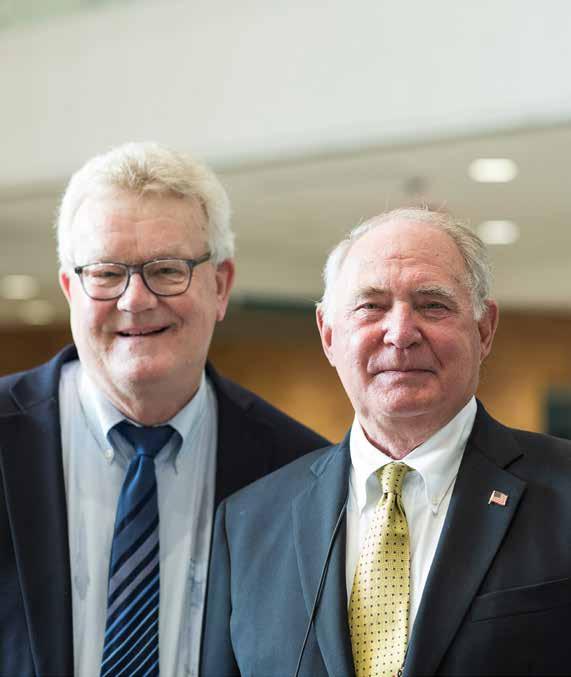

CLC CONNECTS
College of Lake County’s strategic plan is built on the foundation of a student-centered design framework focused on creating an ideal and equitable student experience for everyone.
Page

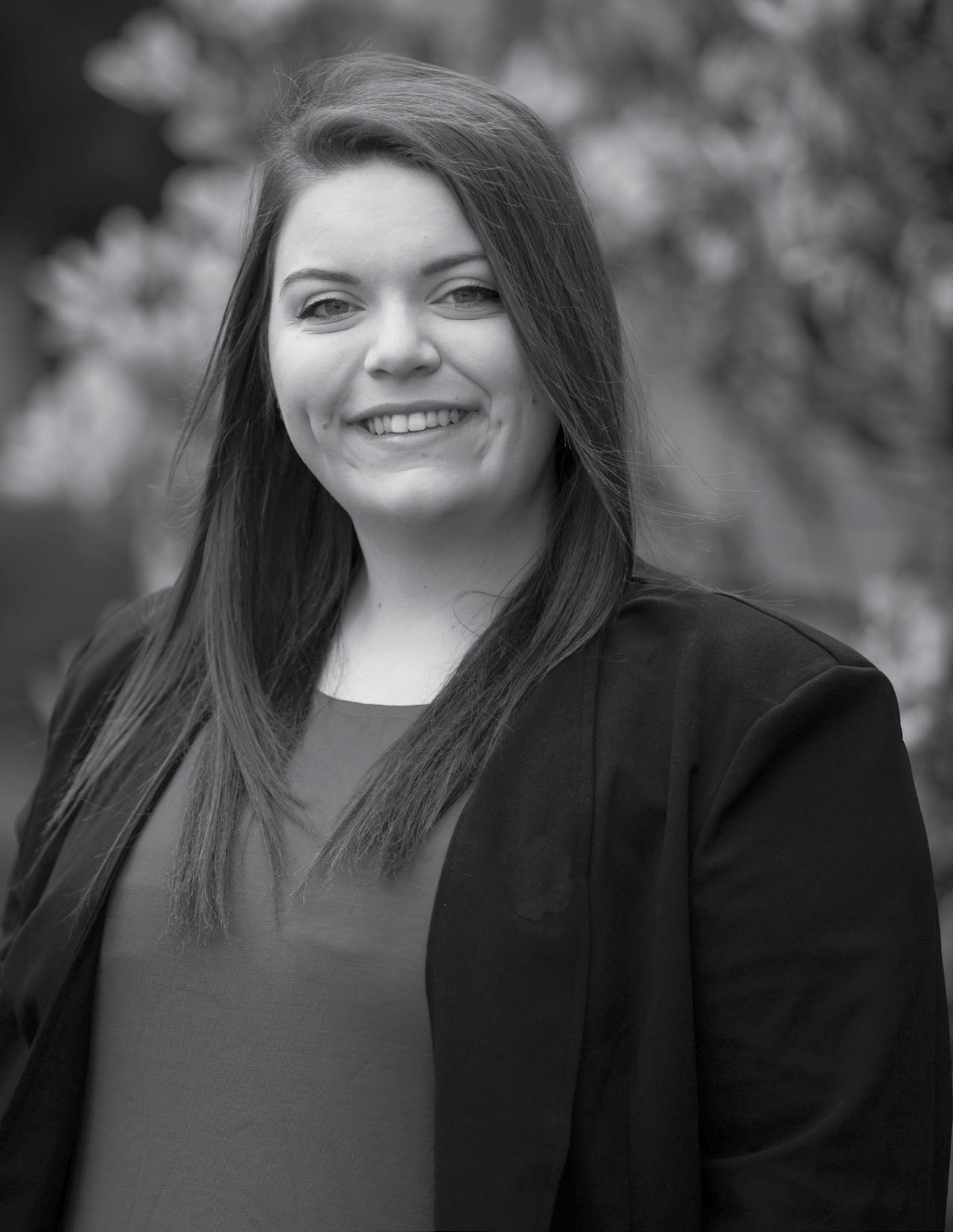
COVER: Victoria Thoman served as an exemplary College of Lake County student trustee this past academic year. She graduated from the college in May and is transferring to University of Illinois, Urbana-Champaign to study social work.

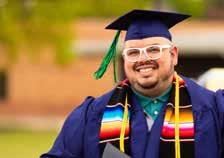
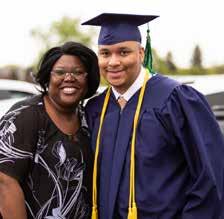

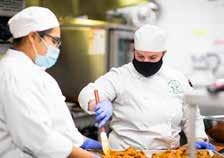

Message from CLC President Dr. Lori Suddick
College of Lake County aspires to be a leader in providing innovative education and workforce solutions.
At CLC, we believe every student can succeed in the right environment with the right supports. We are ensuring holistic supports are available to help students succeed in and out of the classroom. After all, starting college is not the goal— finishing is!
Over the past year, we prioritized several key initiatives of the 2024 Strategic Plan to support improved outcomes for students. Efforts included a redesign of the onboarding and first-year experience, to ensure every student has the college-going knowledge to successfully navigate their first semester, and implementation of affordability initiatives, to reduce the time and cost needed to complete a degree. These initiatives benefit students in numerous ways, including an average annual savings of $1.5 million in textbooks and learning materials, increased access to emergency funds, more laptops and hotspots loaned at no cost and a freeze on tuition and fees for academic year 2021-2022.
Every CLC employee is focused on creating an environment where students feel supported, challenged and empowered to achieve their academic, personal and career goals so they can either transfer to the university of their choice or begin a rewarding, family-sustaining career.
In May, nearly 3,000 students completed their credential at CLC. Earning a degree during a pandemic took resilience and unwavering commitment. These graduates learned in new ways, managed change and adapted to the moment. Their pandemic-related skills are assets as they embark on the next stage of their life journey.
CLC is adapting and changing as well. Beyond the student success efforts of the 2024 Strategic Plan, the college is leveraging collaborative partnerships with community organizations, businesses from every sector and local government agencies to expand programming, resources and opportunities across the diverse communities of Lake County.
I hope you enjoy this first issue of CLC Connects. The stories highlight some of the amazing contributions of staff, faculty and students, as well as community and workforce partners, working together to move Lake County forward.

Scholarships for North Chicago graduates pay for more than tuition
Inaugural Warhawk Lancer Scholars receive support for successful first year at CLC
Like many high school students, North Chicago Community High School graduate Cynric Lance Miaco knew college was the next step but didn’t know how he was going to afford it.
Miaco was among the first graduates of NCCHS Class of 2020 selected for the Warhawk Lancer Scholars last year. His education at College of Lake County is paid for and he received a stipend to help pay for additional course materials and living expenses. Funded by generous donors of the North Chicago Public Education Fund, these scholarships made the dream of free college a reality for six outstanding young people.
“With this scholarship, I was able to be a full-time student without having to work,” said Miaco. “This allows me to focus more on my studies and not think much about finances.” He is studying nursing to get a transfer degree and attend Loyola University.
Announced in January 2020, North Chicago School District 187 Superintendent John Price embraced the initiative to remove cost as the barrier to a higher education. This innovative partnership with CLC is a last dollar scholarship, paying for any remaining balance after a student’s financial aid is applied to their bill. It includes tuition, fees and course materials.
“We know that our students, many who are first-generation college students, need more than free tuition and a laptop, so these scholars also receive additional stipends to pay for transportation and other living expenses, allowing them to focus more of their attention on coursework,” said Price. “Combined with College of Lake County’s academic and career coaching, our students have a greater chance at confronting barriers to success and achieving their goals.”
This program enables each graduate to write their own story of success by providing the support necessary for each student to be successful in college. As students complete their first year at CLC, the college looks forward to welcoming more Warhawk Lancer Scholars.
Lancer Summer Start Program
Starting this summer, new students can begin working on their College Success Seminar and pre-credit requirements for math and English before the fall semester begins – for free. Tuition, fees and course materials are covered 100 percent so students can earn college credits sooner, progressing to degree completion more quickly.
www.clcillinois.edu/summerstart

Redesigning the student journey: Navigating a good start
College of Lake County’s strategic plan is built on the foundation of a student-centered design framework focused on creating an ideal and equitable student experience for everyone. This integrated seamless experience for every student begins with the first point of contact and continues through the student’s awareness and college-knowledge, planning for success, experiential learning, academic progress, timely completion and transition to the workforce or university.
Informed by best practices at community colleges across the country and a national studentfocused organization called Achieving the Dream, purposeful changes are being made to the CLC student experience from the very beginning, so students can progress quickly, saving their most valuable resources of time and money.
Linking new students to the college
Whether they’re entering as a high school graduate or adult learner, all new students will get the help they need navigating the start of college.
“Starting college can be a challenging experience without the appropriate support in place,” said Director of Student Recruitment and Onboarding Dr. Sharon Sanders-Funnye (pictured left). She is dedicated to creating a legacy of lifelong learners. “CLC has been hard at work instituting inclusive strategies to help all new students create a personalized success plan that builds confidence and gets them started on the right path toward a college degree or certificate.”
“We want to serve the students, meet their needs and break down barriers, so they can be successful.”
Additionally, it’s natural for new students to have many questions. “We need to answer them with the student in mind first, then ensure that each student has a personalized success plan in place,” said Sanders-Funnye.
Starting in fall 2020, all students have one point of contact from the moment they inquire about attending CLC. While there are many teams working behind the onboarding scene, prospective students don’t need a long list of contacts to answer questions. Students work with a reliable, friendly navigator to determine exactly what they need to get started.
“This welcoming relationship building fosters a sense of belonging,” said Sanders-Funnye, who leads the team of College and Career Navigators. These strategic staff members become coaches and mentors who guide new students at the beginning of their college path.
The navigators assist new students with learning about CLC, career exploration, selecting a field of interest and program of study, first semester course selection, academic and financial planning and transitioning into college life. What’s more, CLC has partnered with several area high schools to embed a staff member at the school, giving unprecedented access to students exploring what lies beyond senior year.
“I graduated from Waukegan High School and I didn’t have a navigator. There wasn’t a guide person,” said Carolina Rodriguez who is an embedded College and Career Navigator at Wauconda High School. “I look back and wonder why no one told me about College of Lake County. Why didn’t anyone tell me I could’ve saved money, that there were all these scholarships available? My role is to help students in high school who are like I was when I was a high school student.”
Rodriguez is among nearly a dozen navigators who are laying the program’s foundation in its first year. Rodriguez is already seeing
the positive impact at the high school level, even given the pandemic induced fluctuations at areas schools.
“Students benefit from getting the information right from the source. I can go into the classroom and all the students know who I am,” said Rodriguez. “It’s been such a pleasure to connect on a very personal level and really understand from their viewpoint why they’re going into a particular field of interest. Of most of the students I’ve connected with, many are really interested in starting at CLC and transferring to a four-year college or university.”
Before the college and career navigators came on board, the college operated in a more traditional manner with recruiters seeking out prospective students who then handed them off to advisors. Previously a college recruiter, Sarah Nyquist is now a navigator devoted to adult learners and transfer students.
“It’s really exciting, not just for the students, but for us as the first semester advising team,” said Nyquist. Navigators map out a personalized success plan for all students to help guide them during their first semester.
“Everyone’s had an overwhelmingly positive response to the program and the work we can do to serve our students, and really be able to serve them in a very individual capacity.”
STUDENT SUCCESS
/’st(y)oodnt/ s k’ses/ (noun)
Achieving educational attainment for every student by providing personalized, culturally relevant student learning experiences, grounded in equitable practice in an inclusive student-ready environment.

This speaks to the equity and inclusion work CLC is doing to serve every student because education is not a ‘one-size-fits-all’ solution. The college is committed to ensure all policies, procedures and processes are free of barriers and provide a seamless experience to all who come to CLC.
“We have students coming from so many different backgrounds and being a navigator allows us to work with those students ‘one-on-one’ to overcome their barriers,” said Nyquist. “Sometimes students need help with something simple, such as getting records. Other times, it’s more complicated, like finding childcare during class, transportation getting to class or technology to do the coursework. All students can be successful when given the appropriate support services, like they are at CLC.”
Students aren’t the only ones benefiting from the new model. When someone chooses to further their education, it touches every aspect of their lives and that of their community.
“The high schools are getting so much out of the navigator program for their community,” Nyquist added. “They’re getting a great CLC partner who connects with their students. They’re also getting someone who can specifically offer college knowledge and ensure their students are taking advantage of scholarships.”
College navigators have constant training to prepare for the academic first semester advising they use to guide new students. As the initial point
of contact, they help students enroll in their first semester of college, or even preliminary work to ensure they start earning college credits as soon as possible. They work with students to coach them through developing academic, financial, transfer and career plans.
Launching all students on a successful first-year experience
New student orientation is the next important step to the start of a student’s successful career at CLC and it’s a crucial experience many students were missing. That’s because the college’s event-based program was offered in limited capacities and participation was only required for credential-seeking students who graduated from high school within the past two years.
Student success research from CLC shows those who participate in new student orientation are more likely to continue their education from first to second semester. This same data also revealed an unintentional equity issue: Black and African American students were less likely to encounter the orientation program because they were more likely to take a break between high school and college, compared to Latinx and white students. To address equity and advance this early success milestone, 100 percent of new students will engage in a personalized, culturally-relevant onboarding experience starting in fall 2021, regardless of age.
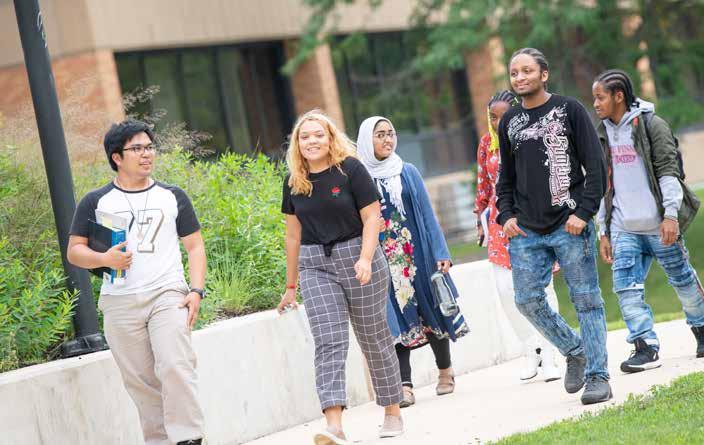

“This redesigned model pulls apart the idea of orientation as a program and shapes it into an integrated experience,” said Director of Student Success Strategy Nick Branson. “It’s a series of steps and conversations, as well as on-demand resources when students are ready for the next piece of information. Each of these touch points builds a deeper connection with students on an individual basis.”
At an institution with tens of thousands of students, it takes college-wide collaboration to do great student success work. Branson organizes and empowers faculty and staff in both their day-to-day role and large collegewide initiatives to improve the CLC student experience.
Starting in the fall, a new convocation ceremony will be offered at the start of every semester. This event builds a sense of belonging and makes students excited for the start of semester. Attendees learn about key resources and hear from the college president, other students and faculty about what it means to be a member of the CLC Lancer community.
It’s also the moment when the students transition from their personal navigator to the academic success advisor who will guide them through the rest of their time at the college. These academic advisors are experts in the student’s field of interest, so they know exactly what courses they should take, saving students time and money.
Additionally, the college created a new College Success Seminar that is integrated into the experience of credential-seeking students. Taught by qualified teaching faculty who are personal development experts, the course covers topics like growth mindset, success strategies and behaviors, CLC resources, financial literacy, self-advocacy and self-identity in a diverse world.
“We expect students who take this class to be more likely to earn more credits toward their credentials and continue to pursue their educational goals,” said Branson. “This is one piece of our broader plan to build an equity-minded success framework which moves CLC to being studentready. It’s designed as an early opportunity for all new students, so they get access to information about resources and support systems, as well as develop skills to help them be successful in college.”
Students earn credits earlier with accelerated English and Math classes
All college students need to have a certain level of English and math skills to begin taking for-credit college classes. Students now begin earning credit toward a credential earlier, instead of taking two semesters to reach credit classes. New accelerated course work is an initiative CLC is doing to intentionally advance student success through strategic, prioritized efforts grounded in equitable practices.
The English department’s Accelerated Learning Program provides developmental English students access to college-credit courses sooner by allowing students to take college-level English along with a small group, workshop-style support class.
The math department partnered with advising to promote a general education math pathway that allows students who might have otherwise spent a semester in a non-credit, developmental math course to instead enroll in another math course where they can earn credits that count toward a credential.

// Tech help makes virtual learning possible
[
Saving students more than money ]
While most students were enrolled in virtual classes in fall 2020, one of the top five challenges to learning they faced was internet connectivity issues. About 40 percent of students said they experienced connectivity issues sometimes or often. At the same time, 68 percent of students said they were not aware CLC offers outdoor Wi-Fi spots and loans hotspots, laptops and other technology for students’ home use.
To help students who struggled with remote accessibility for virtual classes, the college made an investment in technologies, allowing students to continue investing in themselves.
“Our mission is to provide support services and resources to meet the unique needs of our students so they can achieve their goals. That does not stop when the students learn from home,” said Vice President of Student Development Karen Hlavin. “Ensuring students have access to needed technology without the added expense is a priority for the college in these challenging times.”
Since the pandemic began last spring, more than 700 laptops, 400 hotspots and 200 TI-84 calculators were provided to students at no-cost. These loans kept $350,000 in the pockets of students while ensuring they can properly continue their studies.
“It has made a significant difference,” said Alyssa Tucibat, a nursing student from Mundelein. “I have a laptop at home from 2008 I was using prior to borrowing the laptop from the college, but my home computer does not have a camera and therefore does not support Zoom for class lectures.”
Tucibat first enrolled at CLC in 2005 and has earned an associate in science, associate in arts and two certificates over the years. Her most recent educational endeavor saw her enter the college’s nursing program from which she graduated in May 2021. Going virtual almost derailed the whole thing.
“In the last year I have not been able to afford paying for internet, so the hotspot has allowed me to be able to attend Zoom lectures, complete my assignments and read my eBook,” said Tucibat. “Without being able to borrow the laptop, I would not be able to participate in class and my nursing program would have been delayed. Instead, I will graduate in May with my associate degree in nursing.”
Mechanical engineering student Arlet Alcala does not have a computer at her Round Lake Park home. Instead, she has always come to the CLC library when one was needed. But then COVID restricted access to the library.
“Many of us do not have enough money to buy a laptop or computer,” said Alcala. “I have borrowed the laptop for two semesters now and it is an immense help from CLC. I hope to graduate this year and that would not have been possible without this.”
Lancers Keep Learning
While CLC always offered wrap-around student supports to holistically help the community, needs heightened during the pandemic. The college created a new microsite called Lancers Keep Learning with convenient online access to all the resources available to students beyond loaning technology such as health services, financial aid, free tutoring and psychological services.
www.clcillinois.edu/lancerskeeplearning

To meet students where they are with more flexible classes, CLC is taking four of our popular programs and also offering them completely online this fall:
• Supply Chain Management (AAS) –learn the latest in this hot field
• Human Services (AAS) – change your life and others – earn your CADC
• Accounting (AAS) – Our faculty bring real-world experience from the business world into the classroom.
• Associate degree (AA) – Classes are available every eight weeks to earn credits and move toward the degree.
Explore more than 170 degrees and certificates offered at CLC online at www.clcillinois.edu/programs.
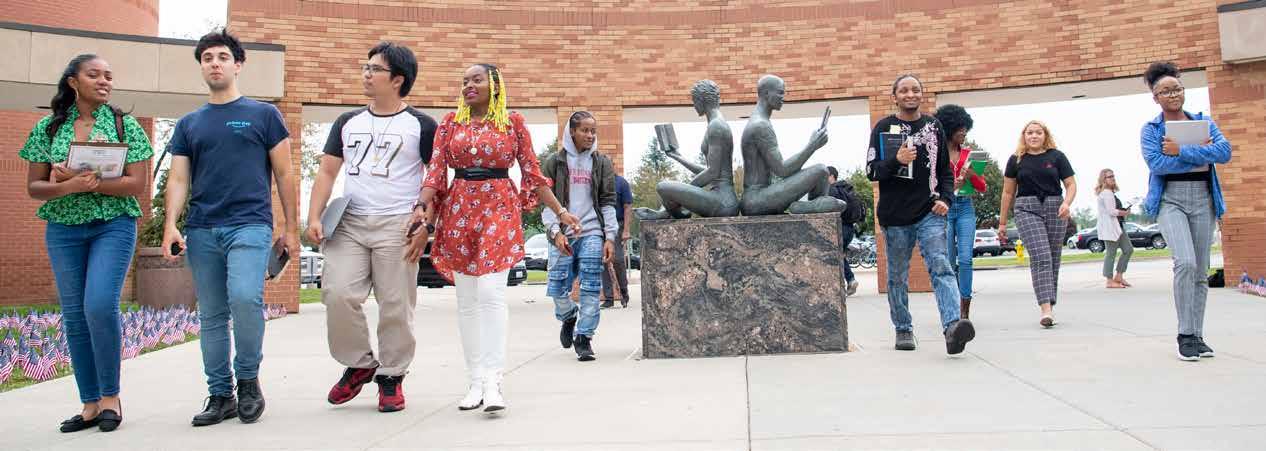
our DiversityCelebrating
From healing circles and LGBTQ+ pride events to a bold new initiative to establish the College of Lake County as a center for truth, racial healing and transformation, the Diversity Council is at the forefront of CLC’s efforts to create a more inclusive, equitable and compassionate world.
By September 2020—eight months into a deadly pandemic after a summer of divisive politics and widespread protests against racial injustice—our nation was in dire need of healing.
At College of Lake County, some of that healing was already happening as a dozen members of the college community convened virtually to share their lived experiences of race, racism and racial justice in the college’s first Lancer Circle.
According to Diversity Council co-chairs Lorri Scott and Jesse Morales— the experience was a cathartic one for everyone involved.
“The time was ripe for us to provide a space for healing after the tensions of the summer of 2020,” says Scott, a legal studies instructor at the college.
“CLC President Dr. Lori Suddick introduced us to the concept of community and restorative circles in 2018,” explains Morales, a college administrator and adjunct faculty member who is a passionate proponent of culturally responsive teaching. “We began to research the topic in 2019. In summer 2020, we trained with a restorative justice practitioner to learn restorative practices and gain insights into circle topics such as community building, peacekeeping and racial healing. Around that time, we accelerated the development of the Lancer Circle program because we could see that there was a growing need in the school community for a safe space where people could come together to talk about challenging, sensitive topics.”
Rooted in the circle process used by Indigenous Peoples for millennia, contemporary community and restorative circles seek to unearth and unlearn the deeply held and often unconscious beliefs created by racism, particularly the belief in a “hierarchy of human value,” which is the perception of inferiority or superiority based on race, physical characteristics or place of origin.
Since that first Lancer Circle, hundreds of CLC students, faculty members and staff have participated in more than 35 virtual circles on topics such as unintentional harm, open-mindedness, developing trust, the 2020 presidential election, navigating conflict, standing against racism and bias triggers.

“The response has been extremely positive,” says Scott. “People appreciate the opportunity to talk about race, misunderstandings and microaggressions. They want to discuss ways to improve their own skills and responses to those issues as a community.”
In recent years, the Diversity Council also has created diversity, equity and inclusion (DEI) statements to guide the school’s 2024 strategic plan, worked with the school’s leadership to create the first gender-neutral restroom on campus and updated every gender-assigned restroom on campus with signage that invites students to use the restroom that best aligns with their gender identity.
“We had a lot of conversations about inclusivity and making every member of our school community feel welcomed—especially those who might feel marginalized in society as a whole,” explains Morales. “One aspect of our campus that was not welcoming was our bathroom signage. So we changed the old, gender-restrictive signs to gender-inclusive ones. It was an easy fix that had an immediate, positive impact.”
During the 2019–20 academic year, the Council’s efforts to create a more inclusive campus culture continued with the debut of a new “Through Our Eyes” speaker series featuring Latinx and African American presenters. The Council also kicked off the College’s first LGBTQ+ pride celebration with a virtual presentation by non-binary trailblazer Kate Bornstein, who spoke about her challenges and achievements as a gender-nonconforming actress. Currently, the Council is in the process of drafting anti-racism and land-acknowledgement statements to guide
“When we sit together in circles and listen to one another, we begin to recognize that we are all one.”
W.K. Kellogg Foundation: https://healourcommunities.org
the school community as it deepens its commitment to diversity, equity and inclusion.
Next up is the Council’s most ambitious initiative to date: the launch of the college’s Truth, Racial Healing and Transformation (TRHT) initiative.
“Lorri and Jesse, along with a few others, were responsible for the college’s proposal to become a Truth, Racial Healing and Transformation Center,” notes Dr. Suddick. “Our work on this project will begin this summer in partnership with the Workforce Development Board and United Way Lake County.”
Through this initiative, CLC will join colleges and universities across the country in a nationwide, community-based effort to bring about transformational, sustainable change and address the historic and contemporary effects of racism.
“Our community partners will be instrumental in helping us develop and implement our TRHT action plan during the coming year,” says Scott. “We will rely heavily on their guidance, mentoring and input as we develop a plan that incorporates the perspectives and needs of our students and faculty, as well as the larger community.”
It’s been a busy couple of years for the Diversity Council and the college’s leadership team as they work together to foster success for every student and employee by creating an inclusive, equitable and barrier-free environment that enables them to achieve their academic, career and personal goals.
But Dr. Suddick and Diversity Council are just getting started. “We’re working hard to make progress and take actions that fulfill the diversity, equity and inclusion statements created by the Council in 2018, which are integrated into our 2024 Strategic Plan,’ she says.
“It’s important to have those statements, but it’s even more important to take action.”
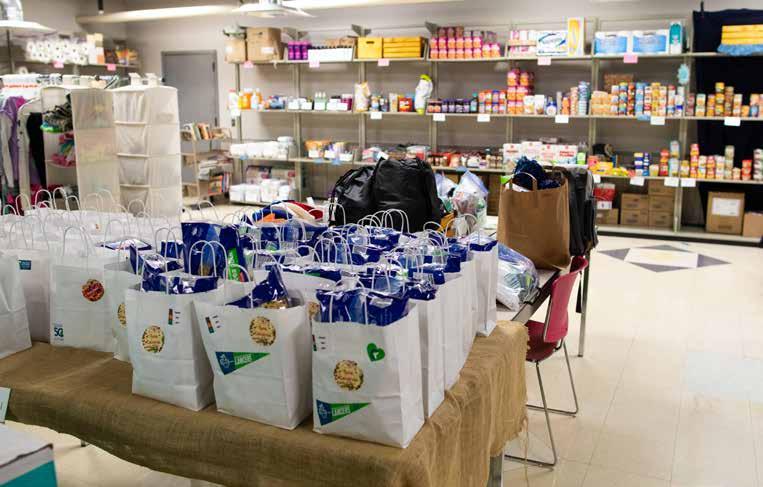
CLC HELPS STUDENTS THROUGH
MOMENTS OF EMERGENCY
The COVID-19 pandemic is not the first crisis CLC students and their families face. More than 80 percent of students report working at least one job while attending classes at CLC. During the pandemic, students had to work reduced hours, take unpaid time off work to quarantine, stay home to take care of family members and some even lost their jobs entirely. Financial barriers in all shapes and sizes become obstacles as students pursue their education. In the works since before stay-at-home orders and social distancing, emergency financial assistance is now available to all students, regardless of their situation.
“Each student’s situation is unique and CLC recognizes even a little help goes a long way,” said CLC President Dr. Lori Suddick. She is passionate about removing barriers to ensure each student has an equitable opportunity to further their education.
While federal Higher Education Emergency Relief Fund (HEERF) grants are a beneficial resource for students, CLC wants to ensure sustainable
SURVIVING THE PANDEMIC AND BEYOND
access to emergency resources for students beyond the pandemic. The Lancer Emergency Assistance Fund (LEAF) will aid students in the best way possible at their time of need.
Funded by CLC Foundation donations and institutional dollars, this emergency assistance will serve many purposes. Students may find themselves needing cash to fix a flat tire so they can drive to class. Struggling to put food on the table, students may need a meal card to buy groceries so they can stay healthy and focus on coursework. They may even need help paying their electric bill while they take classes online.
“Students who apply are free from judgment,” said Suddick.
Not being able to pay for gas should never keep a student out of class. No matter what challenges students face, the college is dedicated to helping them complete their credential so they can get a better job and a better life. Research shows that understanding and addressing student needs holistically can lead to dramatic improvements in students’ outcomes.
STUDENT SAVINGS
Keeping affordability top of mind, the Board of Trustees approved the recommendation to freeze tuition rates and existing course fees for the upcoming academic year. In addition to maintaining the cost of attending CLC, the college continues offering student employment in a remote work environment. The college did not furlough or layoff a single employee, including student workers, during the pandemic.
TECH HELP
When the pandemic restricted access to campus, basic student needs such as access to reliable internet and computers became a stuck point. Students couldn’t attend virtual classes from their phones. The college quickly rose to meet the challenge, loaning hundreds of hotspots and laptops free of charge and providing free Wi-Fi in college parking lots so Lancers could keep learning.
MENTAL HEALTH
In addition to the Health Center where students can get low-cost laboratory testing and flu shots, CLC offers free therapy services for students. During the pandemic, Counseling and Psychological Services offered remote sessions via telehealth. Support includes individual therapy, mental health workshops, after-hours support and referrals to community resources.
“It is a program of care and compassion for the Lancer community.”
CARING CALLERS
CLC employees volunteered throughout the pandemic to help with calling campaigns. More than 5,000 personal phone calls were made to students. The college called to see how they were doing amid challenges brought by the COVID-19 pandemic. Callers became a friendly motivational voice students could talk to about challenges they faced, and the college connected them with student support services for further assistance.
AFFORDABLE CHILDCARE
The college is dedicated to helping students and their families learn. Two nationally accredited centers let students concentrate on their own academic success, knowing their child will learn and play in modern, secure surroundings, supervised by childcare professionals while in class. Services are available year-round at the Grayslake and Lakeshore (Waukegan) campuses at competitive rates partially underwritten by student activity fees.
FREE FOOD
SHARE Market at CLC is committed to providing food and other resources that are accessible to all students who have a need, and to promoting sustainable food practices in order to continuously improve the quality of the college experience for the diverse community it serves. Students can select from meal kits, toiletries, baby items, non-perishables and household items.


FOCUS ON FACULTY SUCCESS FROM HIRE TO RETIRE
Faculty can have a fundamental impact on the lives of their students. Natalia Casper (pictured above) learned this lesson firsthand when she took a calculus class at College of Lake County many years ago. Casper was a quiet student who sat in the back of the classroom. Her instructor recognized Casper’s brilliance and told her so. “The experience changed my life. One teacher made all the difference by giving me confidence. After that, I became excited to pursue teaching at the college level.”
Since then, Casper works tirelessly trying to return the favor. She became a CLC math instructor 23 years ago. And like many higher education teachers, prior to coming to the college, she had no formal training to learn how to teach. She was a demonstrated expert in her academic field, but not yet trained on best teaching practices, often called pedagogy. Dedicated to student success, CLC teaching philosophy is rooted in proven teaching techniques to support student success. Through faculty mentoring and professional learning, Casper became an award-winning active and engaging educator her students really learn from.
“Most students hate math because it can feel like it’s impossible to succeed,” she said. “Instead of memorizing formulas, I teach them in a useful way that helps students escape from feeling lost. Students don’t suddenly get better at math, but they become comfortable using it, giving them an empowering feeling of mastery. That’s when learning becomes fun.”
It’s easy for an instructor to be one-dimensional, but it’s hard for students to learn that way. Pedagogical research shows students grasp new concepts better when the instructor goes beyond the basics of writing on the board and teaching through one-way lectures. But becoming an excellent, multi-dimensional teacher doesn’t happen overnight. It takes an entire career of continuous work and a rich environment full of faculty who care deeply about their students.
Casper says self-reflection drives faculty to refine their student-focused learning methods. It’s not a linear checklist, but each faculty member is on a journey to master high-impact practices going beyond learning in the classroom.
To create a student-ready college in which everyone can succeed, CLC is building an inclusive and flexible educational environment that meets students where they are. Faculty, like Casper, are pivotal players who work with each student in and out of the classroom. Their dedication to teaching and learning excellence to benefit students is a game changer. CLC is improving the ways students can accumulate credit hours and progress toward a credential more quickly. Credit accumulation is an important momentum point that leads to graduation. The college’s faculty play an important role in helping students succeed, one class at a time. Instructors celebrate coursework wins with students, motivating them to finish.
“Grounded in equity-minded, reflective and data-informed practice, CLC furthers teaching and learning excellence by empowering faculty in their important role in student success,” said Vice President of Educational Affairs and Chief Academic Officer Dr. Sonya Williams. “The college is doing this in many ways throughout faculty development. We’re offering faculty courses about examining pedagogy through data and engaging in meaning professional development. By integrating academic supports with classroom learning and student feedback, CLC is working toward improving student credit accumulation.”
The college recently established CLC CARES guiding principles for teaching and learning excellence at the institution:
CARES
• Solution-focused CLC
• Culturally relevant
• Learner-centered
• Collaborative
• Continuous
• Active
• Reflective
• Evidence-based
These guiding principles build up core dimensions including integrating diversity, equity and inclusion into classes, implementing learningcentered teaching practices, committing to continuous improvement and professional learning, designing measurable learning outcomes and standards for student success and engaging beyond the classroom. Faculty members who engage on all levels with this work achieve teaching, learning, leadership and subject matter excellence.
Learning how to teach
One opportunity CLC faculty are taking to strengthen their teaching and learning excellence is by achieving a nationally recognized teaching credential through the Association of College and University Educators (ACUE). These course-takers have demonstrated their commitment to teaching excellence and to ensuring our students receive the best education possible by completing ACUE’s rigorous course in Effective Teaching Practices. This course requires them to implement evidencebased teaching practices in their classes. These teaching practices are
“College of Lake County classrooms are filled with the best teaching faculty.”
proven to help students learn more, stay engaged and graduate in higher numbers.
Faculty had such an unexpectedly overwhelming response when the ACUE opportunity was first made available in 2019, the college started with more than double the number planned. A third cohort will start in fall.
“It is clear the faculty at CLC have a passion for their students,” said Director of Academic Programs ACUE director of academic programs
Carmen Macharaschwili. “I could tell by the energy of the faculty who had committed to the course that they were there to learn how to help their students be successful and they were eager to learn how to do so effectively.”
This year-long curriculum for post-secondary educators focuses on how pedagogy impacts student success. After earning their Certificate in Effective College Instruction, these faculty members across departments and disciplines will continue to transform student experiences in the classroom.
“This class helped me remove quite a bit of barriers from the students I teach,” said Warren Thomas, an adjunct instructor and student success coordinator for adult education. “I learned how to use new techniques and hone a few I was already using to better connect with students, increasing dedication to their own education.”
This program is supported by CLC’s Teaching, Learning and Educational Technology Center and contributes to the college’s goal to empower faculty to intentionally design learning experiences for students that engage and prepare them for their next opportunity.
“The college knows effective teaching practices make a difference for student success,” said Page Wolf, CLC Faculty Development Chair. “Faculty are experts in their disciplines but sometimes may not be educated about certain approaches to teaching and the proven effect these approaches have on a student’s ability to succeed.”
With a growing body of educational experts, CLC continues to motivate more students to keep moving forward with their goals.
STACKABLE SKILLS ACCELERATE STUDENTS FOR MANUFACTURING JOBS

Advanced Technology Center opens Fall 2022
When the state-of-the-art Advanced Technology Center (ATC) opens its doors in 2022, College of Lake County students can proceed with sharpening their skills to earn the short- and long-term credentials needed to fill the high-skill, high-wage and in-demand workforce jobs of the Lake County manufacturing and technology sector.
“One in seven workers in Lake County is employed in the manufacturing sector,” said CLC Vice President of Community and Workforce
Partnerships Dr. Ali O’Brien. “When completed, the center promises to supply area industry with a steady, highly trained stream of local talent that also can have an impact on economic development by helping attract, retain, and grow manufacturers in the area.”
As the second largest manufacturing county in Illinois, Lake County is an economic powerhouse, outputting $35.7 billion in goods a year. This new facility will keep the region at the forefront of modern, global manufacturing by delivering industry-responsive career pathways for students that align with the economic-development needs of the area’s manufacturing and technology sectors.

With the backing of community partners, foresighted business leaders and industry visionaries, CLC soon will offer its students and local employers an unparalleled technology center complete with knowledgeable faculty to provide hands-on training and instruction with the industry’s latest equipment and technology. Best of all, this innovation resource will be local, affordable and accessible to all.
Recognizing the need to act, in December 2020 the college purchased a 142,000-square-foot former big-box store in Gurnee to house the ATC. Its adaptive-use design provides for tailored
program spaces for automation, robotics, mechatronics, mechanical engineering, industrial engineering, computerized numeric control (CNC) machining, advanced manufacturing, industrial maintenance and welding/fabrication.
“The ATC will offer students industry certifications embedded in hands-on classes with engaging, detailed and guided instruction,” said Dean of Engineering, Mathematics and Physical Sciences Dr. Richard Ammon. “Most of the jobs these graduates will go into come with familysustaining wages well above minimum wage. Some of our graduates in mechatronics, with the program’s one-year certificate, make more than people coming out of school with bachelor’s degrees. Our career pathway will train students to get into the workforce quickly, then allow them to come back to the college and continue to advance their knowledge, skills and ultimately value to companies.”
Once completed, students will be well prepared for further education or, critically, eligible for immediate employment. Those receiving an Associate in Applied Science degree can advance their careers by transferring to a four-year college or university to work toward a bachelor’s degree.
Continuing education for employees
The acceleration of change in the manufacturing industry requires current employees to keep their skillsets up to date. At the same time, the local economy thrives when its residents have meaningful and challenging work that provides them with a promising career and the ability to advance in their profession.
The ATC offers classes for our traditional students and local employees both. With easy access to short-term, industry-specific training through intensive one-to-eight-week courses in a state-of-the-art facility, industry will prosper and grow and so will their employees.

“A well-educated workforce builds the foundation for shared economic prosperity.”
Noah Berger and Peter Fisher; Economic Analysis and Research Network Report: A Well-Educated Workforce is Key to State Prosperity (August 22, 2013)

A Pipeline to Prosperity
EARN WHILE YOU LEARN WITH APPRENTICESHIPS
Since its inception in August 2020, College of Lake County’s apprenticeship program created new pathways to student success by combining career-related classroom instruction with on-the-job training guided by a mentor. It’s a win-win situation: student apprentices earn while they learn and get a jumpstart on their chosen careers while local employers gain access to a custom-trained workforce.
CLC’s new student apprentices are a diverse group:
• Darrell Berg, a 59-year-old Navy veteran and former computer programmer, is apprenticing with Aon to find a pathway back to corporate America after a decade of semi-retirement.
• Olivia Peterson (pictured above), a 28-year-old with master’s degrees in music and library science, is preparing for a new career in auto collision repair after she experienced a dearth of opportunities in the music field and her prospects for a second career as a librarian dimmed during the pandemic.
• Jesse Navarro, a 44-year-old former factory worker, is apprenticing at Leppala Machining to get the specialized skills he needs to program and operate advanced manufacturing equipment.
Their circumstances and career interests couldn’t be more different. But their apprenticeship experiences have one thing in common: they’ve been life changing.
“I
never thought I’d be returning to corporate America—and, by the time I realized I might have to, it would have been difficult to follow a traditional pathway,” says Berg. “This apprenticeship program was the answer for me. It’s not just for students coming out of high school. It’s for everyone.”
Peterson wanted to forge a career in a field where women were underrepresented.
“I read a story about a woman who, like me, was educated in a different field but really wanted to expand opportunities for women,” she says. “She decided to start a new career as a mechanic, opened her own shop and now employs an all-female staff of mechanics. I was so inspired by that. Then I received a brochure about College of Lake County’s apprenticeship programs in the mail. When I opened it, there was a photo of a young woman buffing a classic car, with copy that read: ‘Come join one of our apprenticeship programs.’ I was sold! I’m having so much fun now—and I’m finally in a situation where I can say, ‘I just want to be at work.’”
After 26 years of general factory jobs, Navarro’s apprenticeship experience has inspired him to dream bigger.
“Right now, my main goal is to finish the apprenticeship program,” he confides. “But after that I may get into some form of engineering— robotics and automation or aerospace. Or maybe I’ll run my own shop.”
The seeds of CLC’s apprenticeship program were planted in 2017 during the college’s strategic visioning process.
“We wanted to remove barriers to student success by developing an apprenticeship program that would reduce the cost and time involved in getting a college degree while equipping students with skills that were aligned with marketplace needs,” says Vice President of Community and Workforce Partnerships Dr. Ali O’Brien. “We also wanted to create a more robust workforce pipeline by preparing students to fill positions in need of qualified applicants as baby boomers reached retirement age and manufacturing continued to expand in Lake County.”
“The data coming in at the county and national level indicated apprenticeships were a successful way for employers to fill their talent pipeline and increase their retention rates,” she adds. “So, we reached out to local businesses and corporations to gauge their interest in partnering with us and to determine their specific industry needs, which became the main drivers of our program design.”
Meanwhile, O’Brien and her team were making good on another strategic objective: the establishment of the college’s new Community
Sources: apprenticeship.gov and nationalapprenticeship.org
and Workforce Partnerships Unit (CWP)—which has a multifaceted mission and resources that range from the James Lumber Center for the Performing Arts to a Workforce and Professional Development Institute and a Career and Job Placement Center.
COMMUNITY AND WORKFORCE PARTNERSHIPS
The CWP unit was part of a broader effort to position the college as a hub for education, culture and workforce prosperity. “It was conceived,” says O’Brien, “to bring the college, community organizations and local employers together to achieve that goal.”
With this new infrastructure in place, the team forged ahead with program development. “We built workforce relationships, gathered commitments from employers, hosted information sessions for current and prospective students, talked to local workforce boards and contacted community organizations to spread the word about the program,” recalls Dr. Sylvia Johnson Jones, executive director of the CWP’s Career and Job Placement Center. “We also worked closely with CLC faculty members and apprentice employers to strengthen the academic components of the apprenticeships and ensure what was taught in the classroom was relevant in the workplace.”
The first workforce partners to commit to the program were as diverse as the apprentices they hired.
“We have everything from a mom-and-pop machine shop with four employees to global corporations,” says Apprenticeship Manager Daniel Ortego. “Aon, which has made a national commitment to growing its apprenticeship program, was the first to partner with us. Ten other workforce partners signed after that, enabling us to offer apprenticeships in five fields of interest: automotive, business, horticulture, manufacturing and information technology.”
By August 2020, the program was in full swing, with 21 apprentices ranging in age from 18 to 59 pursuing new educational and career opportunities in specialties running the gamut from automation, robotics and mechatronics to cybersecurity and landscape design.
In March 2021, the program got another boost. Manufacturing x Digital (MxD)—which equips U.S. factories with digital tools and expertise and leads cybersecurity and workforce development efforts to ensure that digital manufacturing has the security and talent it needs to be effectively deployed—collaborated with CLC to financially support the manufacturing apprenticeship program.

GRANT-FUNDED APPRENTICESHIPS
With a $244,000 grant that originated from the Siemens Foundation, MxD is now partnering with the college to help close the digital skills gap in the Lake County area by aligning workforce training with market needs through CLC apprenticeships. The grant will cover tuition fees and some living expenses for students enrolled in automation, robotics and mechatronics and computerized numeric control apprenticeship programs. A portion of the funding also will be used to integrate cybersecurity into the college’s curriculum to support the development of a local workforce equipped to handle cybersecurity threats in manufacturing settings. Because it removes many of the traditional barriers to degree completion and career advancement, apprenticeships have been a saving grace for the students in our first cohort.
Max Lehman, a 30-year-old CLC apprentice at Siemens in Buffalo Grove, is a case in point. Lehman was previously working full-time as a waiter and trying to squeeze in a class or two as he pursued an associate degree in automation, robotics and mechatronics. He was serious about his education, but life kept getting in the way.
Now he’s working in his chosen field and earning a salary with benefits while making steady progress toward his degree as a full-time student. His educational expenses are fully paid, and he receives a stipend to help with living expenses such as rent, transportation and work clothing. “I feel way more confident about my future now because I’m earning a degree while gaining a skill set that’s in high demand,” says Lehman. “In a little over a year, I’ll graduate with zero debt and a full-time job at one of the top companies in the country.”


TRANSFORMING OUR LAKESHORE CAMPUS
With a nearly $48 million campus renovation and expansion project underway, the college is realizing its vision of a vibrant urban campus serving as an educational and cultural hub for the Lake County community, promoting economic prosperity through workforce partnerships, revitalizing Waukegan’s central business district and providing innovative programming to enhance community health and well-being.
Lakeshore Dean Jesus Ruiz
When Tiffany Peppers first set foot on College of Lake County’s Lakeshore Campus, she was 19-years-old with a high school degree and an uncertain future.
“I had spent 10 years in foster care—and when I arrived in Waukegan to start my senior year of high school, it was my fourth school in four years,” she confides. “After I graduated, I got a job because I didn’t know a thing about applying to college. But one day I caught a bus to CLC’s Lakeshore Campus and found my way to the admissions office. The staff there guided me through the admissions process, made sure I got a scholarship and helped me change my life.”
Peppers is now a doctoral student and executive director of the JIC Community Development Corporation, a nonprofit dedicated to educating, empowering and enriching the lives of people in the Waukegan community. A member of the CLC Foundation Board, she also serves on the Lakeshore Campus Advisory Committee—a coalition of civic leaders who partner with the college to ensure the campus meets community and workforce needs.
Today, Peppers can see the Lakeshore Campus from her office on Genesee Street—and she’s thrilled to see her alma mater undergoing a transformation as radical and life-enhancing as her own.
“With this expansion,” she says, “we’ll be able to serve more students and add more courses and programs—so more lives can be changed.”
The Lakeshore Commitment
“This ambitious capital enhancement project fulfills many of the objectives outlined in the Lakeshore Commitment to provide a more accessible, equitable and successful college experience for Lakeshore Campus students,” says CLC President Dr. Lori Suddick.
“For many years, CLC students living in the Waukegan area had to travel to our Grayslake Campus to take classes not available here,” adds Lakeshore Campus Dean Jesus Ruiz. “With this campus expansion, we’ll be able to offer increased access to high-quality educational opportunities, an expanded curriculum, guaranteed access to core courses and more flexible start times on a state-of-the-art campus with 21st-century learning spaces and technologies.”
A Full-Service Campus Experience
At the heart of the campus expansion is a $48-million, six-story, 62,692-square-foot Student Center.
Designed to meet LEED Platinum certification standards for sustainable architecture and a healthier planet, the center will house a Welcome and One-Stop Center with centralized student services, library and resource center with meeting spaces and study areas, adult education and career placement centers, general education classrooms, laboratories for the college’s certified nursing assistant and phlebotomy programs, tutoring center, testing rooms and support services.
The Eleanor Murkey Community Center on the building’s top floor—


welcoming space for student and community gatherings with panoramic views of Lake Michigan and an open-air balcony.
In recent years, the college expanded its curriculum with new programs in automation, robotics and mechatronics, healthcare and HVAC to equip students with the skills and knowledge they need to succeed in a marketplace transformed by 21st-century technologies. The new Student Center will provide the infrastructure for more programmatic expansion in areas such as digital media, entrepreneurship, horticulture, hospitality and manufacturing.
Other campus enhancements include the renovation of our Children’s Learning Center and an existing science lab, the creation of a new classroom and the transformation of our Lakeshore Campus Plaza into an inviting outdoor oasis with benches, gardens and greenery.
Building a Healthier Community
A soon-to-be-developed urban farm will enhance the well-being of the Waukegan community by bringing food, health and jobs together in one location.
In partnership with the Chicago Botanic Garden through its Windy City Harvest urban agriculture program, a Center for Urban Agriculture and Community Development will provide access to fresh produce and nutrition education for community members; job training and certification programs in agricultural vocations, food safety, cooking and nutrition; wraparound services and supports to reduce food insecurity; and access to safe, green outdoor spaces made possible through thoughtful landscape design. The farm will serve as a learning lab with 32,000 square feet of growing space for hydroponics, aquaponics and raised-bed growing technologies.
A “Veggie Rx” distribution center will partner with local health care providers to offer nutrition education, fresh produce and cooking classes for residents with diet-related diseases. An indoor market will sell fresh, affordable produce and nutritious prepared foods throughout the year and a student-run cafe will serve healthy menu and to-go items made from ingredients grown on the farm.
“The college and Chicago Botanic Garden are committed to ‘equity in access and success’ so every citizen in Lake County can pursue a quality education and live a healthy, productive life,” says College of Lake County Foundation Executive Director Kurt Peterson. “Both organizations are deeply committed to working with and within communities to lift people up by giving them the opportunities and resources they need to not only survive but thrive. This partnership, which will be supported primarily through private philanthropy, is an investment not only in education and equity, but in a healthier future for the Lake County community.”


CLC cooks in the kitchens of Brae Loch
Things are heating up as CLC expands its hospitality and culinary management program to the vacant Brae Loch Golf Club facility, thanks to a partnership with the Lake County Forest Preserves. The banquet facility near the Grayslake Campus on Route 45 will soon be occupied with the next generation of culinary students sharpening their cooking skills at CLC.
The space will be fitted with top-of-the-line kitchen equipment to better train our culinary students, while increasing community awareness of the college’s program and how it prepares the workforce with the latest skills. The college offers associate degrees in hospitality and culinary management and baking and pastry arts with plans to expand hospitality into its own program and add a catering and event management credential.

Through innovative grant partnerships and privately funded foundation scholarships, College of Lake County is removing the financial barriers to a higher education and helping hundreds of low-income students—from recent high school graduates to middle-aged career changers—graduate debt free and realize their dreams of a better life.
Closing the Opportunity Gap
Many CLC students are just one emergency or unexpected expense away from completing their certificate or degree programs. For 28-year-old Desiree Diamond, that emergency was COVID-19.
“I was working in the culinary field and being off work during the pandemic meant there was no way I could afford to pay for my classes,” says Diamond. “Without a scholarship, furthering my education to become a healthcare office assistant would have been out of the question.”

For Shauntel Jones, the barriers were different but equally daunting. “I had exhausted my financial aid years ago when I was working toward my associate degree, and I was still paying off student loans,” says the 44-year-old healthcare worker. “I’d been caring for hospital patients for more than a decade—and I loved my patients—but I was getting older and having health issues. I needed to get a desk job in a smaller healthcare setting to make it to retirement. I never could have done that without a scholarship for job training.”
“Scholarships helped me stay on track when I was in college and kept me from giving up on my dream of a higher education.”
Despite barriers like these, hundreds of CLC students like Diamond and Jones have achieved their educational goals—thanks to a groundbreaking partnership between 17 Illinois community colleges, the Illinois Community College Board and the Illinois Legislative Black Caucus called the Workforce Equity Initiative (WEI).
Over the past two years, the college received $2.7 million in grant funding from this initiative to support its Transform Lake County scholarship program—which covers tuition and fees, course materials, textbooks, industry-exam fees and even some living expenses—so lowincome, minority students can get the short-term vocational training and certification they need to earn a living wage.
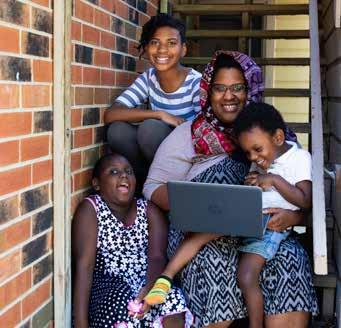
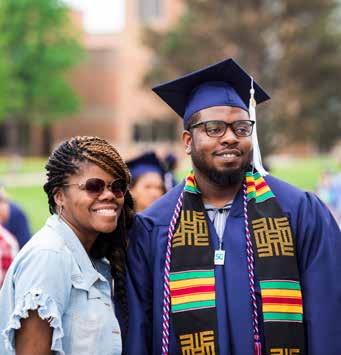
Diamond, who completed her healthcare certificate in May 2021, feels like she has options for the first time since the pandemic hit.
Jones, who has also completed her certificate, is now qualified to embark on a second career that’s a better fit for her life stage and circumstances. “The Transform Lake County scholarship removed a huge financial barrier for me,” says Jones. “It gave me peace of mind because I knew I was gaining the skills and knowledge I needed to qualify for a healthcare office job with fewer physical demands.”
Stories like these resonate with CLC Vice President of Strategy, Planning and Support Derrick Harden, whose own life was immeasurably enriched by scholarship support.
“As a first-generation college graduate who benefited from the generosity of scholarship donors, I’ve personally experienced the life-changing impact of scholarship programs,” says Harden.
That gratitude fuels Harden’s work today as his team collaborates with state representatives, private foundations and the College of Lake County Foundation to increase grant and scholarship opportunities for CLC students.
“Partnerships like the Workforce Equity Initiative are essential for student access and success in our diverse community,” says Lakeshore Campus Dean Jesus Ruiz. “The Transform Lake County program would not have been possible without the support of State Representative Rita Mayfield and the Legislative Black Caucus. We’ve collaborated with Representative Mayfield on many college infrastructure and student-success initiatives. Her advocacy at the state level has been invaluable.”
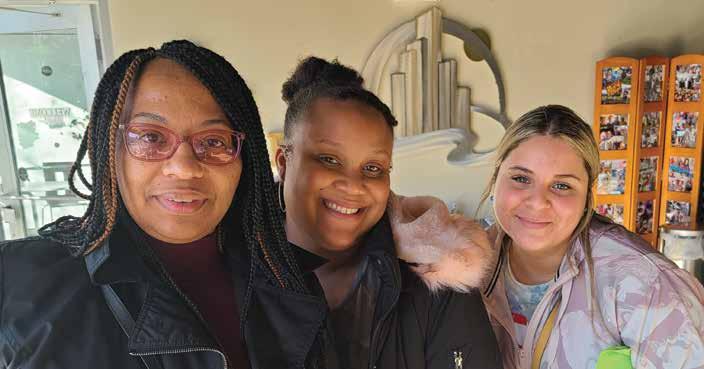
TRANSFORM LAKE COUNTY
2,000+ Applicants
45
According to Ruiz, the WEI-funded CLC Transform Lake County program has already prepared students for jobs that pay 30 percent above the living wage or more than $17.68 per hour.
“WEI grant funding has enabled us to remove many barriers to student success by covering the cost of tuition and fees for short-term vocational training,” he emphasizes. “More than 200 students have received Transform Lake County scholarships to pursue training in CLC programs such as administrative management technology, auto-collision repair, automotive technology, SolidWorks® CAD software, certified Nurse Assisting, forklift operator, healthcare office assistant, heating and air-conditioning technology, phlebotomy and truck driving. Forty-five of these students are already employed with an average wage of $18.88 per hour— filling workplace skills gaps and revitalizing the Lake County workforce.”
Metallica Scholarships
One of CLC’s most interesting partnerships is with Metallica— a critically acclaimed American heavy metal band with substantial commercial success.
In late 2018, CLC was one of 10 community colleges across the nation selected to partner with Metallica’s All Within My Hands Foundation to improve career opportunities for community college students in the trades. An initial cohort of 61 CLC students received Metallica scholarships in 2019 to pursue vocational training in automotive collision repair, automotive technology, computerized numerical controls, electrical engineering technology, HVAC, automation, robotics and mechatronics, laser/photonics/optics and welding.
David Arizmendi—an 18-year-old majoring in automotive technology at CLC at the time— was one of those students. His story was featured on the Metallica All Within My Hands Foundation website.
“Hi Metallica Scholars Award donors,” he wrote. “Thank you from the bottom of my heart for your generosity and kindness. This scholarship relieved my stress about paying my tuition fees and enabled me to buy a starter tool set required for my automotive classes. I’m planning to become a professional mechanic. My goal is to become a car designer and design my own supercar. My greatest ambition—and the one thing I want most—is to take my mom out of poverty. When I’ve accomplished these dreams and have money, I plan on giving back to my community and inspiring other young automotive majors to accomplish their goals with a scholarship of my own.”
During the program’s first year, more than 60 CLC students benefited from the scholarships, with a 90 percent program completion rate and a 95 percent job placement rate. Metallica renewed its support for CLC students in 2020 and 2021.
Creating affordable opportunities
Although tuition at CLC is only a third of the cost of a public university and one ninth of the cost of a private university in Illinois, 25 percent of CLC students rely on financial aid and scholarship support to complete their studies.
“Our goal is to remove every possible barrier so our students can focus on their learning,” says Harden. “To fulfill that mission, we need to remove certain barriers to degree or certificate completion. We offer traditional scholarships, which help cover the cost of tuition fees and books, as well as stipends and emergency funds to cover expenses such as food, childcare, transportation and other personal needs.
“Our mission as a community college is to help all our students achieve their educational goals, regardless of their life circumstances.”
One barrier, Harden points out, can be the complex or confusing scholarship application process. “We recently simplified the scholarship application process. Now, rather than having to sort through a list of scholarships to see which ones they qualify for and submitting multiple applications, our students fill out a single form and a counselor does the rest.”
Kurt Peterson is the executive director of the College of Lake County Foundation, which raises funds for more than 100 different scholarships, to generate more scholarship support for students in need.
“During the 2019-20 academic year—thanks to the extraordinary generosity and commitment of our local foundations and benefactors— we awarded over $1 million in scholarships to more than 600 students and provided additional emergency funding to students experiencing pandemic-related financial hardships,” Peterson reports. “More than 50 percent of our foundation scholarships were awarded to first-generation college students.”
“These benefactors make our mission to promote equity and inclusion in education possible,” states CLC President Dr. Lori Suddick. “We are profoundly grateful for their continued support, which enables us to provide high-quality educational opportunities that lead to life-sustaining wages for the diverse communities that we serve.”
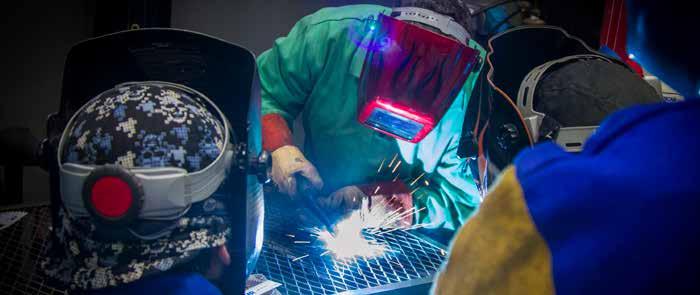
Legacy of Lancers
College of Lake County is honored to be the place where more than 70,000 students graduated with degrees and certificates since the college opened in 1969. Through the CLC Alumni Award Program, we recognize distinguished alumni based on their community impact and commitment to carry out the college’s values.
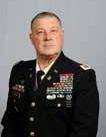
MEET PAUL HETTICH ‘90
SELFLESS SERVANT
Retired U.S. Army Colonel Paul Hettich leads the life of a selfless servant. After three decades of military service and five tours of combat duty, Hettich is deeply involved as a leader in local community organizations, making Lake County a better place to live. An Antioch resident, Hettich is a 1990 graduate of College of Lake County and his lifelong dedication to civic service recently earned him the college’s Distinguished Alumni Award.
“My life has been shaped by education, beginning with College of Lake County where I studied marketing,” said Hettich. He went on to earn his bachelor’s degree, master’s degree, Master of Strategic Studies degree, several diplomas, credentials and professional licenses. His decorated military service demonstrates his dedication to excellence.
Hettich continues working as a U.S. Army Reserve Ambassador in Illinois. He also works part-time as technical director for Center Stage Productions, a deputy ranger police officer for Lake County Forest Preserves in Libertyville and a court security police officer for the Lake County Sheriff’s Department in Waukegan.
Cub Scout leader, parks and recreation trustee, American Legion vice commander, president of a homeowners’ association and fourth degree knight with the Knights of Columbus, Hettich’s list of civic duties only grows in his retirement, most of it unpaid, volunteer work.
To nominate yourself or another deserving Lancer for the CLC Alumni Recognition Award, contact alumni@clcillinois.edu to request the nomination packet. 2022 nominations are due 12/31/2021.

MEET BECKY MORAN ‘96
DEDICATED COACH
Today you can find Becky Moran overseeing all 16 athletic programs as the athletic director at Round Lake High School, but in 1996, Moran (then Kirby) was flying across the soccer field at CLC as both player and team captain.
The college is proud to award her the Distinguished Alumni Award. The start of her story is like many who have walked, and have yet to walk, the halls of CLC.
“As a high school student, I was lost,” said Moran. “I did not know what the future had in store for me. My mom wanted me to go to college and I knew did not want my athletic career to end. CLC was close to home, so I applied.”
She became the first member of her family to attend college and did so while working at least two jobs throughout her CLC career to make ends meet. Though these were not the easiest of days, Moran says she learned independence, perseverance and grit from the experience. Traits she tried to instill in her players after she became the assistant coach for the college’s women’s soccer team in 1999; a position she served for four years.
“Attending CLC opened doors I did not know I wanted to walk through.”
“I was able to start my coaching career and I fell in love with it. I found my ‘why,’ which is helping others achieve at the highest level possible,” said Moran.
Moran went on to serve as an assistant athletic director at several area high schools before becoming the director of athletics at Argo Community High School in 2016, and then into her current position at Round Lake High School in 2019. She serves in leadership roles with several local and national athletic associations.
“People believed in me when I may not have deserved it and I continue to pay it forward,” said Moran. “My path set me on the course to where I am today, impacting the lives of countless young people in a positive way.”
RECORD-BREAKING DONATIONS TO FOUNDATION
More than $3 million has been fundraised by the CLC Foundation during the 2021 fiscal year. These dollars make higher education possible for students who plan to transfer to a four-year school, complete a career credential and enter the Lake County workforce.
In addition to scholarships, donors are helping fund capital improvements at our Advanced Technology Center and Lakeshore Campus. The college received a $2 million anonymous commitment, our largest gift to date, kicking off fundraising for the Urban Farm Project that will focus on community education, food, health, and jobs. The Foundation is building philanthropic partnerships supporting strategic campus initiatives and furthering the college’s mission to deliver high-quality, accessible learning opportunities, advance student success, and strengthen the diverse Lake County communities we serve.
OPENING DOORS TO EDUCATIONAL OPPORTUNITY FOR ALL OF LAKE COUNTY 1,119 AWARDS
$826,526.93 TOTAL FOR SCHOLARSHIPS AND EMERGENCY FUNDS
STUDENTS WHO RECEIVED FOUNDATION SCHOLARSHIPS COMPARED TO STUDENTS WHO RECEIVED OTHER FINANCIAL AID:
19351 W. Washington St., Grayslake, IL 60030-1198
CLC Connects is published biannually by the Public Relations and Marketing department. To subscribe, unsubscribe or update an address, email PR@clcillinois.edu or call (847) 543-2094.
POSTMASTER: Send change of address to CLC Connects, College of Lake County 19351 West Washington Street, Grayslake, IL 60030-1198
Volume 1, Issue 1 June 2021
Board of Trustees
Amanda D. Howland, J.D. Chair
Julie B. Shroka, M.A. Vice Chair
Torrie Mark Newsome, J.D. Secretary
Gerri Songer, M.A.
Matthew J. Stanton, J.D.
Robert J. Tomei, Jr., J.D.
Paul G. Virgilio, B.S., S.E., P.E.
Daniel Blaine Student Trustee
Lori Suddick, Ed.D. President
ORGANIZATION US POSTAGE PAID GRAYSLAKE, IL PERMIT NO. 53
After a combined 71 years of experience governing College of Lake County while serving on the Board of Trustees, Richard A. Anderson and Dr. William M. Griffin received trustee emeritus status in April 2021. They join other trustee emeriti, Patricia Jones and Barbara D. Oilschlager. The Board also welcomed three newly elected members: Gerri Songer, Robert J. Tomei, Jr. and Paul G. Virgilio.



